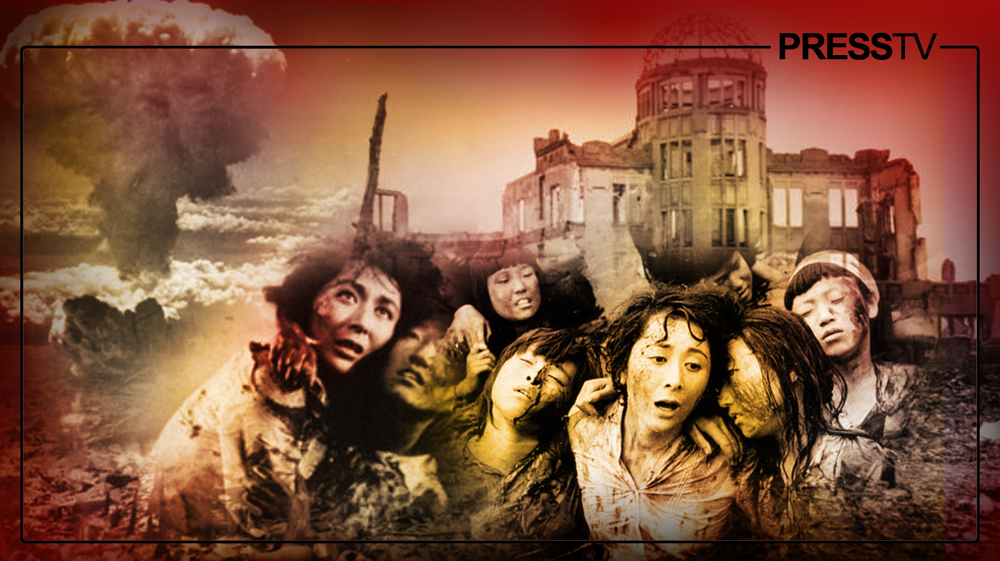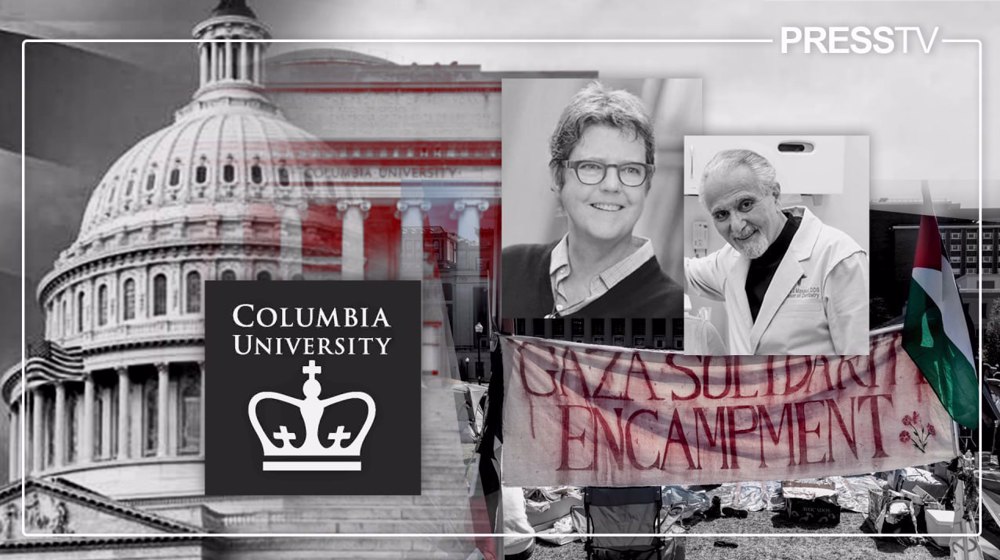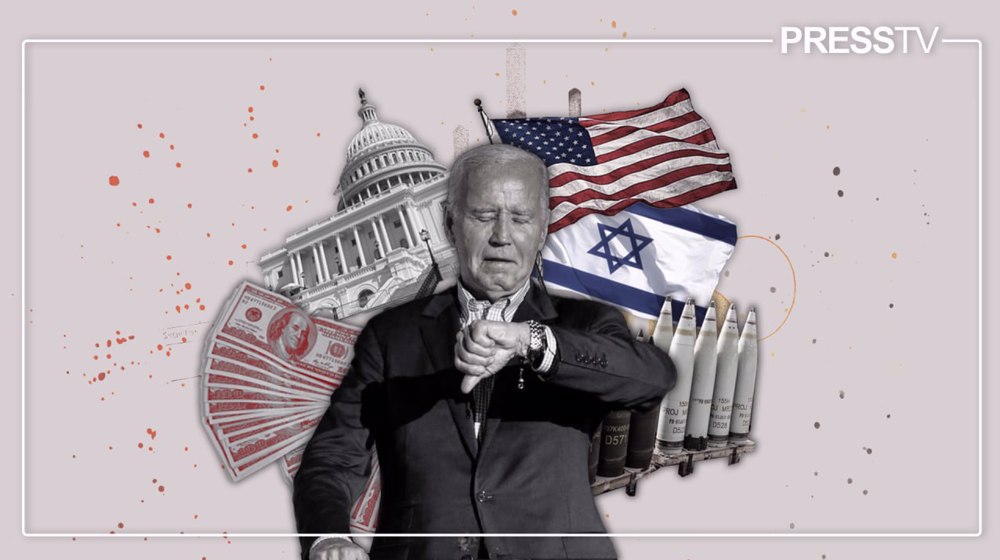#HiroshimaDay: When US dropped first-ever atomic bomb, killing 140,000
By Amin Farahani
On August 6, 1945, on the orders of then-US President Harry Truman, an American B-29 bomber ‘Enola Gay’ dropped the world’s first-ever atomic bomb on the Japanese city of Hiroshima.
The devastating explosion killed more than 140,000 people and wreaked havoc in the Asian country. It was followed by another catastrophic bomb on the city of Nagasaki three days later.
The explosions came barely weeks after the US carried out the world’s first nuclear explosion on July 16, 1945, after a plutonium implosion device was tested 200 miles south of New Mexico.
J Robert Oppenheimer, a Jewish scientist, earned the dubious sobriquet of “the destroyer of worlds” for playing the main role in the Manhattan Project during World War II to create the bomb.
Steve Howell, author of ‘Collateral Damage’ and ‘Over the Line’, in a tweet remembered those killed in the Hiroshima nuclear bombing, who he said were “left only as burnt shadows.”
“Let's also remember that it was a crime - Truman knew Japan would have surrendered anyway, as two history professors explained in the LA Times in 2020,” he wrote, referring to an article by Gar Alperovitz and Martin Sherwin published in the Los Angeles Times on August 5, 2020.
On #HiroshimaDay, let's remember the 100,000 plus civilians who were killed - left only as burnt shadows.
— Steve Howell (@FromSteveHowell) August 6, 2023
But let's also remember that it was a crime - Truman knew Japan would have surrendered anyway, as two history professors explained in the LA Times in 2020. https://t.co/acJoFSZs9C
The article dismissed the widespread academic perception that dropping the bombs on Hiroshima and Nagasaki was the only way to end World War II without an invasion.
“The overwhelming historical evidence from American and Japanese archives indicates that Japan would have surrendered that August, even if atomic bombs had not been used — and documents prove that President Truman and his closest advisors knew it,” read the article.
Naveen Patnaik, the chief minister of the eastern Indian state of Odisha, in a tweet, said Hiroshima reminds the world of “one of the most devastating events in history that caused unfathomable destruction and sufferings to countless lives.”
#Hiroshima reminds us of one of the most devastating events in history that caused unfathomable destruction and sufferings to countless lives. On #HiroshimaDay, let’s pledge to build a future without nuclear weapons and work for lasting world peace. pic.twitter.com/Lji3inZNoz
— Naveen Patnaik (@Naveen_Odisha) August 6, 2023
Chicago Committee Against War and Racism, a Chicago-based anti-war and anti-racism grassroots movement, cited Prof. Yuki Miyamoto, the author of Beyond the Mushroom Cloud: Commemoration, Religion, and Responsibility after Hiroshima, as explaining the meaning of “mushroom cloud.”
“The mushroom cloud is not merely representing the victims of Hiroshima and Nagasaki, it also represents the 1,032 nuclear tests the U.S. conducted...on the indigenous people and the Marshallese. Their suffering is not yet humanized,” she said.
Prof. Yuki Miyamoto, “The mushroom cloud is not merely representing the victims of Hiroshima and Nagasaki, it also represents the 1,032 nuclear tests the U.S. conducted...on the indigenous people and the Marshallese. Their suffering is not yet humanized.” #HiroshimaDay pic.twitter.com/zVxljuS7AI
— Chicago Committee Against War & Racism (@NoWarNoRacism) August 6, 2023
Hanaa Singer-Hamdy, the UN resident coordinator for Nepal, said the tragedy is unforgettable.
“Never forget the victims, never forget history,” she wrote. “The 78th anniversary of Hiroshima bombing is a reminder of one of the events in history that caused unfathomable destruction and suffering.
Never forget the victims, never forget history!
— Hanaa Singer-Hamdy (@SingerHanaa) August 6, 2023
The 78th anniversary of #Hiroshima bombing is a reminder of 1 of the events in history that caused unfathomable destruction & suffering.
On #HiroshimaDay lets reaffirm our commitment to☮️ & nuclear disarmament 2 nvr let this happen
Peace for Asia, a Geneva-based institution researching security, human rights, sustainability and climate change in Asia, also took to Twitter to remember the Hiroshima victims, saying the day will “haunt entire humanity about the destructive power of nuclear weapons for posterity.”
On this day, #hiroshima was destroyed by an atomic bomb. The day will haunt entire humanity about the destructive power of nuclear weapons for posterity.
— Peace For Asia (@peaceforasia) August 6, 2023
Join us in observing the #HiroshimaDay https://t.co/WSio2d24XB
Wim De Ceukelaire, a Brussels-based health and social justice activist, said he will “never forget one of the worst atrocities in modern history.”
“On August 6, 1945, the United States flattened the city of #Hiroshima in Japan with one single atomic bomb because most other cities had been destroyed already in a massive carpet bombing campaign.”
On August 6, 1945 the United States flattened the city of #Hiroshima in Japan with one single atomic bomb because most other cities had been destroyed already in a massive carpet bombing campaign. We'll never forget one of the worst atrocities in modern history. #HiroshimaDay pic.twitter.com/i8HOUuyLJI
— Wim De Ceukelaire (@wimdeceuk) August 6, 2023
Tamim Akhtar, a political activist from India, cited South Africa’s anti-apartheid icon Nelson Mandela as saying that there is no country in the world that has committed as many atrocities as the US.
"If there is a country that has committed unspeakable atrocities in the world, it is the USA. They don't care for human beings,” said Mandela. “The US, which callously dropped atomic bombs on Hiroshima & Nagasaki, had no moral authority to police the world.”
"If there is a country that has committed unspeakable atrocities in the world, it is the USA. They don't care for human beings..
— Tamim Akhtar (@itstamimakhtar) August 6, 2023
The US, which callously dropped atomic bombs on Hiroshima & Nagasaki, had no moral authority to police the world" - Nelson Mandela#HiroshimaDay pic.twitter.com/UePq5zDglm
Barry Naylor, an Anglican priest and socialist based in Leicester England, said he prays for “peace, for reconciliation, for the healing of relationships, for mutual respect,” while remembering the tragedy.
#HiroshimaDay - remembering the anniversary of the use of the first atomic bomb.
— Barry Naylor ن (@KaJuror) August 6, 2023
Praying for peace, for reconciliation, for the healing of relationships, for mutual respect, for a true sorrow for whenever we have been purveyors of suspicion and hate, rather than love.
Mary, pray pic.twitter.com/JzRFyeznTY
On Sunday, people and government officials in the city of Hiroshima came together to observe the 78th anniversary of the bombing that left a trail of death and destruction.
On the occasion, the mayor of Hiroshima again reiterated his call for the abolition of nuclear weapons while Prime Minister Fumio Kishida warned that the road to a world without nuclear weapons was getting steeper amid looming threats due to growing geopolitical differences.
Meanwhile, in a tweet on Sunday morning, Iran's foreign ministry spokesman Nasser Kana'ani called out the US for its history of using nuclear weapons and supporting the nuke-armed Israeli regime.
"U.S.A is the only govt. with a dark history of using nukes as a WMD & aiding an illegitimate regime with the largest nuclear arsenal," he wrote.
"Is it fit to be the flag bearer of a nuclear weapons ban!? Its’ claims about Iran’s nuclear program are a deliberate repetition of a big lie."
VIDEO | Unseen agony: Missing loved ones of genocide in Gaza
Iran cuts gold import tariff to zero
Pezeshkian: Iran determined to develop, boost ties with neighbors
VIDEO | Israel, Hamas ceasefire agreement: Closer than ever
VIDEO | Gaza ceasefire to be put in place under resistance conditions
Hot water and sewage: Palestinians share harrowing tales of torture in Israeli prisons
VIDEO | Thousands evacuated in Ethiopia amid earthquakes, volcanic eruption fears
Revealed: Israeli ministers eye restoration of illegal settlements in Gaza through genocide










 This makes it easy to access the Press TV website
This makes it easy to access the Press TV website